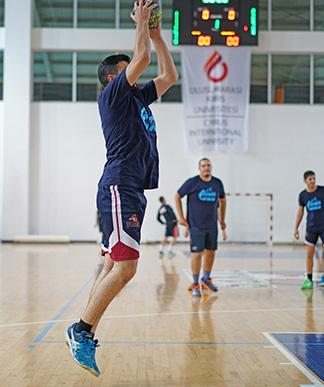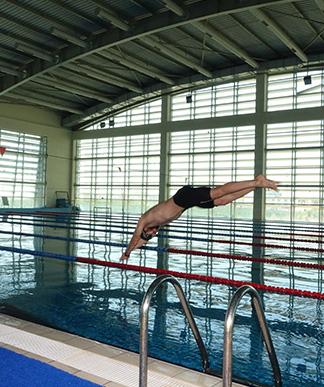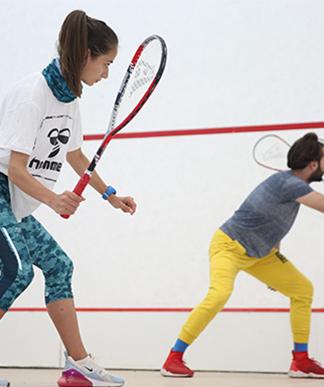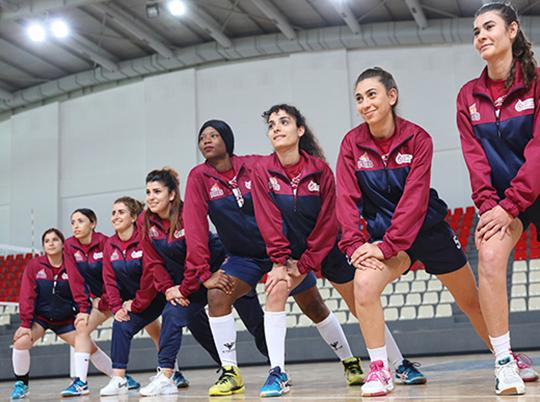


About the Program
The Physical Education and Sports Teaching Program educates teachers who have pedagogical formation and can carry out Physical Education and Sports classes in schools. The program aims to educate sports trainers with the ability to contribute to cognitive, emotional and psychomotor traits by teaching various sports skills, sports branches through sports-specific teaching methods to individuals with different characteristics from any age group. Our graduates can work as instructors in various sports centers, aerobics centers and fitness centers as a physical education and sports teacher as well as in schools affiliated to the Ministry of Education. Graduates also obtain a Level 1 sports trainer certificate in a sports branch they have undertaken during the undergraduate education.
Education Opportunities
Physical Education and Sports Teaching Program graduates can register for postgraduate and doctoral programs, if they fulfill the requirements. Also, they must be successful in the KPSS examination in order to become a teacher in the public schools of Turkey. This condition is not required for teachers in private institutions. Graduates can also serve as physical education and sports teachers in pre-schools. They will have a 1st -level sports trainer license in a sports branch they have specialized in during their undergraduate education. Graduates are able to take sports trainer credits and improve their grades by benefiting from the fitness and other sports branch courses they have previously taken. Graduates who expect to be appointed as teachers can be employed in different areas of the sports sector.

Career Areas
During their undergraduate education, students may earn a certificate if they participate in the certificate programs held for the development of the students at the School of Physical Education and Sports. Graduates can be sports managers in different sectors in the Turkish Republic of Northern Cyprus or Turkey, such as private sector institutions, hotels, motels and similar facilities, and as managers at different positions in the practices of private sports halls, organizations, and businesses. Furthermore, employment can be found in activities related to social development of health, as administrators of the relevant staff of local government offices, in the organization of sporting activities, and as a practicing professional sports manager. Graduates may also be employed as physical education and sports teachers in private institutions where disabled people are trained. BA graduates can upgrade their sports trainer credentials they receive and be exempted from certain courses.
Contact
Faculty of Education
Çevik Uraz Center, CU 237
Tel: +90 392 671 1111 Extension: 2701
Faculty E-mail: secretary-foe@ciu.edu.tr
Dean: Prof. Dr. Fatoş SİLMAN
Dean E-mail: fsilman@ciu.edu.tr
Compulsory Courses
First Semester
HAREKET EĞITIMI
Course code
BESO101Credit
3Theoretical
2Practical
2Ects
3THE BASICS OF PHYSICAL EDUCATION AND SPORTS
Course code
BESP101Credit
3Theoretical
3Practical
0Ects
3HUMAN ANATOMY AND KINESIOLOGY
Course code
BESP103Credit
3Theoretical
3Practical
0Ects
3INFORMATION TECHNOLOGIES
Course code
BILT123Credit
3Theoretical
3Practical
0Ects
5SOCIOLOGY OF EDUCATION
Course code
EGIT111Credit
2Theoretical
2Practical
0Ects
3INTRODUCTION TO EDUCATION
Course code
EGIT121Credit
2Theoretical
2Practical
0Ects
3ENGLISH LANGUAGE-I
Course code
INGL151Credit
2Theoretical
2Practical
0Ects
3ATATÜRK PRINCIPLES AND HISTORY OF TURKISH REFORMS-I
Course code
TARH101Credit
2Theoretical
2Practical
0Ects
3TURKISH LANGUAGE - I
Course code
TREG121Credit
2Theoretical
2Practical
0Ects
4Second Semester
ATHLETICS
Course code
BESP102Credit
2Theoretical
1Practical
2Ects
4HEALTH INFORMATION AND FIRST AID
Course code
BESP104Credit
2Theoretical
2Practical
0Ects
3TEAM SPORTS-I
Course code
BESP108Credit
2Theoretical
1Practical
2Ects
4PHILOSOPHY OF EDUCATION
Course code
EGIT104Credit
2Theoretical
2Practical
0Ects
3EDUCATIONAL PSYCHOLOGY
Course code
EGIT122Credit
2Theoretical
2Practical
0Ects
3ENGLISH LANGUAGE-II
Course code
INGL152Credit
2Theoretical
2Practical
0Ects
3COMMUNITY SERVICE PRACTICES
Course code
SOSH100Credit
2Theoretical
1Practical
2Ects
3ATATÜRK PRINCIPLES AND HISTORY OF TURKISH REFORMS-II
Course code
TARH102Credit
2Theoretical
2Practical
0Ects
3TURKISH LANGUAGE-II
Course code
TREG122Credit
2Theoretical
2Practical
0Ects
4Third Semester
MOTOR DEVELOPMENT
Course code
BESP201Credit
3Theoretical
3Practical
0Ects
3TEAM SPORTS-II
Course code
BESP209Credit
2Theoretical
1Practical
2Ects
4RHYTHM EDUCATION AND DANCE
Course code
BESP223Credit
2Theoretical
1Practical
2Ects
4GYMNASTICS
Course code
BESP233Credit
2Theoretical
1Practical
2Ects
4SWIMMING
Course code
BESP243Credit
3Theoretical
2Practical
2Ects
3RESEARCH METHODS IN EDUCATION
Course code
EGIT227Credit
2Theoretical
2Practical
0Ects
4TEACHING TECHNOLOGIES
Course code
EGIT233Credit
2Theoretical
2Practical
0Ects
4UNIVERSITY ELECTIVE
Course code
UNISXX1Credit
3Theoretical
3Practical
0Ects
4Fourth Semester
EXERCISE PHYSIOLOGY
Course code
BESP202Credit
3Theoretical
3Practical
0Ects
5PHYSICAL EDUCATION AND SPORTS PROGRAM AND TEACHING APPROACHES
Course code
BESP216Credit
2Theoretical
2Practical
0Ects
3PRINCIPLES AND METHODS OF TEACHING
Course code
EGIT206Credit
2Theoretical
2Practical
0Ects
4MEASUREMENT AND EVALUATION IN EDUCATION
Course code
EGIT224Credit
2Theoretical
2Practical
0Ects
4FREE ELECTIVE
Course code
SSECXX1Credit
2Theoretical
2Practical
0Ects
5FREE ELECTIVE
Course code
SSECXX2Credit
2Theoretical
2Practical
0Ects
5UNIVERSITY ELECTIVE
Course code
UNISXX2Credit
3Theoretical
3Practical
0Ects
4Fifth Semester
ALAN SEÇMELİ
Course code
BESOXX1Credit
3Theoretical
3Practical
0Ects
5TEAM SPORTS-III
Course code
BESP303Credit
2Theoretical
1Practical
2Ects
3OUTDOOR SPORTS
Course code
BESP315Credit
2Theoretical
2Practical
0Ects
3TRAINING INFORMATION
Course code
BESP325Credit
2Theoretical
2Practical
0Ects
3CLASSROOM MANAGEMENT
Course code
EGIT301Credit
2Theoretical
2Practical
0Ects
4CURRICULUM DESIGN IN EDUCATION
Course code
EGIT335Credit
2Theoretical
2Practical
0Ects
3FREE ELECTIVE
Course code
SSECXX3Credit
2Theoretical
2Practical
0Ects
5UNIVERSITY ELECTIVE
Course code
UNISXX3Credit
3Theoretical
3Practical
0Ects
4Sixth Semester
ALAN SEÇMELİ
Course code
BESOXX2Credit
3Theoretical
3Practical
0Ects
5ALAN SEÇMELİ
Course code
BESOXX3Credit
3Theoretical
3Practical
0Ects
5SKILLS LEARNING
Course code
BESP302Credit
3Theoretical
3Practical
0Ects
3PHYSICAL FITNESS
Course code
BESP304Credit
3Theoretical
3Practical
0Ects
3RACKET SPORTS
Course code
BESP310Credit
2Theoretical
2Practical
0Ects
4BEDEN EĞİTİMİ VE SPOR ÖĞRETİMİ
Course code
BESP316Credit
3Theoretical
2Practical
2Ects
4TURKISH EDUCATION SYSTEMS AND SCHOOL MANAGEMENT
Course code
EGIT326Credit
2Theoretical
2Practical
0Ects
3SPECIAL EDUCATION AND INCLUSION
Course code
OZEG322Credit
2Theoretical
2Practical
0Ects
3Seventh Semester
ÖĞRETMENLİK UYGULAMASI-I
Course code
BESO401Credit
5Theoretical
2Practical
6Ects
10EDUCATIONAL GAMES
Course code
BESO403Credit
2Theoretical
1Practical
2Ects
3ALAN SEÇMELİ
Course code
BESOXX4Credit
3Theoretical
3Practical
0Ects
5FOLK DANCES
Course code
BESP403Credit
2Theoretical
1Practical
2Ects
3EXERCISE AND NUTRITION
Course code
BESP405Credit
2Theoretical
2Practical
0Ects
2GUIDANCE IN SCHOOLS
Course code
EGIT403Credit
2Theoretical
2Practical
0Ects
3FREE ELECTIVE
Course code
SSECXX4Credit
2Theoretical
2Practical
0Ects
5Eighth Semester
ÖĞRETMENLİK UYGULAMASI-II
Course code
BESO402Credit
5Theoretical
2Practical
6Ects
10BEDEN EĞİTİMİ VE SPORDA ORGANİZASYON VE YÖNETİM
Course code
BESO404Credit
2Theoretical
2Practical
0Ects
3SAĞLIKLI YAŞAM VE EGZERSİZ PROGRAMLAMA
Course code
BESO406Credit
2Theoretical
2Practical
0Ects
3UYARLANMIŞ BEDEN EĞİTİMİ VE SPOR
Course code
BESO408Credit
2Theoretical
1Practical
2Ects
3ALAN SEÇMELİ
Course code
BESOXX5Credit
3Theoretical
3Practical
0Ects
5ALAN SEÇMELİ
Course code
BESOXX6Credit
3Theoretical
3Practical
0Ects
5Elective Courses
HAPPINESS
Course code
EGIT424Credit
2Theoretical
2Practical
0Ects
3CAREER PLANNING AND DEVELOPMENT
Course code
EGIT215Credit
2Theoretical
2Practical
0Ects
3DRAMA IN EDUCATION
Course code
EGIT346Credit
2Theoretical
2Practical
0Ects
4.
Course code
EGIT356Credit
2Theoretical
2Practical
0Ects
4ADULT EDUCATION AND LIFELONG LEARNING
Course code
EGIT360Credit
2Theoretical
2Practical
0Ects
4COMPARATIVE EDUCATION
Course code
EGIT353Credit
2Theoretical
2Practical
0Ects
4TR Applicants
TR Students who are successful in the exams conducted by the Higher Education Council Student Selection and Placement Center (ÖSYM) and are entitled to enroll in our university in line with their preferences can complete the registration process with the necessary documents for registration from our Registration and Liaison Offices throughout Turkey or from the Marketing Directorate on campus.
Click for detailed admission requirements information.
TRNC Applicants
TRNC citizens and TR citizen candidate students who have completed their entire high school education in TRNC. They are placed in undergraduate programs in line with their success in the CIU Student Placement and Scholarship Ranking Exam and the programs they prefer.
Students who are successful in the exam can register from the TRNC Marketing Office.
Tuition Fees are determined at the beginning of each academic year. Candidate students who are entitled to enroll in CIU can learn their fees in line with the Tuition Fee Calculation system.